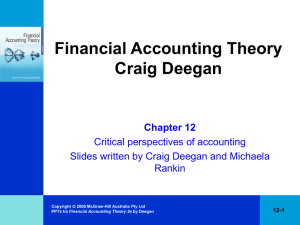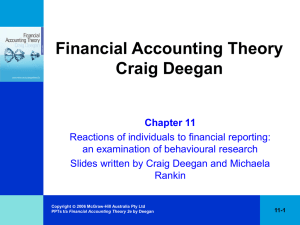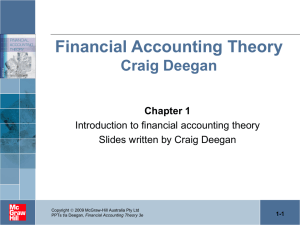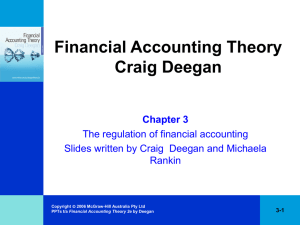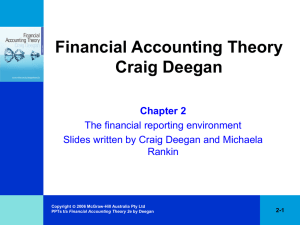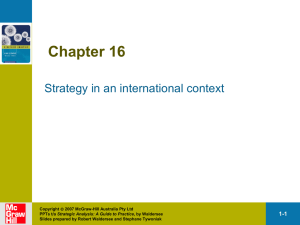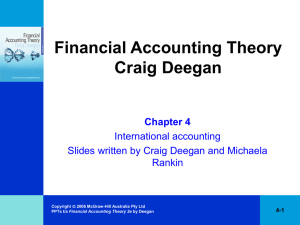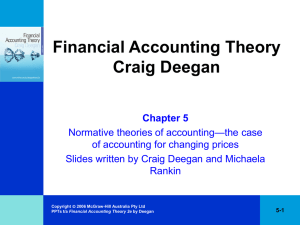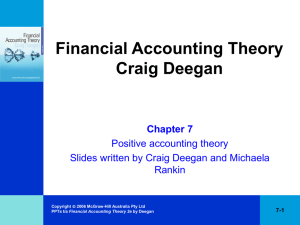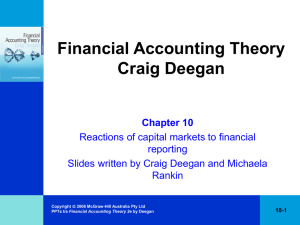ACCOUNTING Financial and Organisational Decision Making
advertisement
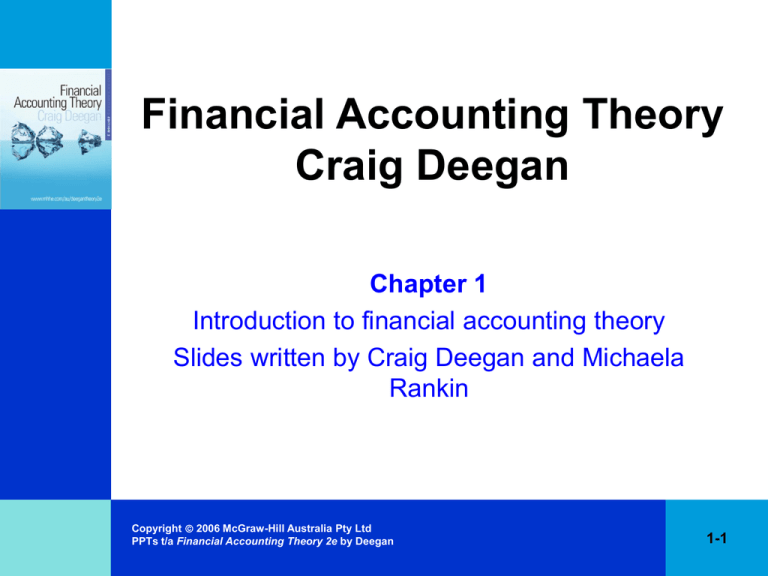
Financial Accounting Theory Craig Deegan Chapter 1 Introduction to financial accounting theory Slides written by Craig Deegan and Michaela Rankin Copyright 2006 McGraw-Hill Australia Pty Ltd PPTs t/a Financial Accounting Theory 2e by Deegan 1-1 Learning objectives • In this chapter you will be provided with evidence that shows that – there are many theories of financial accounting – the different theories of financial accounting are often developed to perform different functions, such as to describe accounting practice or prescribe particular accounting practices Copyright 2006 McGraw-Hill Australia Pty Ltd PPTs t/a Financial Accounting Theory 2e by Deegan 1-2 Learning objectives (cont.) – theories, including theories of accounting, are developed as a result of applying various value judgements and that acceptance of one theory, in preference to others, will in part be tied to one’s own value judgements – we should critically evaluate theories before accepting them Copyright 2006 McGraw-Hill Australia Pty Ltd PPTs t/a Financial Accounting Theory 2e by Deegan 1-3 What is a theory? • ‘A coherent set of hypothetical, conceptual and pragmatic principles forming the general framework of reference for a field of inquiry’ (Hendriksen 1970, p. 1) • Based on logical (coherent) reasoning, and not ad hoc in nature Copyright 2006 McGraw-Hill Australia Pty Ltd PPTs t/a Financial Accounting Theory 2e by Deegan 1-4 Accounting theories • Accounting is a human activity • It would seem illogical to study financial accounting (for example, the accounting standards) without also studying accounting theory • Theories of accounting consider – people’s behaviour with respect to accounting information – people’s needs for accounting information – why people within organisations elect to supply particular information Copyright 2006 McGraw-Hill Australia Pty Ltd PPTs t/a Financial Accounting Theory 2e by Deegan 1-5 Examples of uses of accounting theories • Theories might – prescribe how assets should be valued – predict why managers will choose particular accounting methods – explain how an individual’s cultural background affects accounting information provided – prescribe what accounting information should be provided to particular classes of stakeholders – predict that the relative power of a stakeholder group will affect the accounting information it receives Copyright 2006 McGraw-Hill Australia Pty Ltd PPTs t/a Financial Accounting Theory 2e by Deegan 1-6 Overview of theories of accounting • Many theories of financial accounting exist • No universally accepted theory of accounting – different perspectives about the central objective, role and scope of financial accounting • No universally accepted perspective about the role of accounting theory – different researchers have different perspectives of the role of accounting theory – a researcher’s own values will influence which theory he or she elects to embrace Copyright 2006 McGraw-Hill Australia Pty Ltd PPTs t/a Financial Accounting Theory 2e by Deegan 1-7 Early development of accounting theory • Relied upon the process of induction – development of ideas or theories through observation • 1920s to 1960s theories developed from observing what accountants did in practice – codified as doctrines or conventions of accounting Copyright 2006 McGraw-Hill Australia Pty Ltd PPTs t/a Financial Accounting Theory 2e by Deegan 1-8 Criticisms of inductive method • ‘… concentrates on the status quo, is reactionary in attitude and cannot provide a basis upon which current practice may be evaluated or from which future improvements may be deduced’ (Gray, Owen & Maunders 1987, p. 66) • Assumes what is done by the majority is the most appropriate practice • Perspective of accounting Darwinism Copyright 2006 McGraw-Hill Australia Pty Ltd PPTs t/a Financial Accounting Theory 2e by Deegan 1-9 Example of inductive approach to theory development • Grady (1965) undertook research commissioned by the American Institute of Certified Public Accountants (AICPA) • Formed the basis of APB Statement No. 4 ‘Basic Concepts and Accounting Principles Underlying the Financial Statements of Business Enterprises’ – reflected generally accepted accounting principles at the time Copyright 2006 McGraw-Hill Australia Pty Ltd PPTs t/a Financial Accounting Theory 2e by Deegan 1-10 Theory development—1960s and 1970s • Sought to prescribe particular accounting practices – known as normative theories • Not driven by existing practices, and hence not typically inductive in nature (that is, not based on observation) • Rather, were deductive in nature and, based on logical argument, sought to develop new methods of accounting • Theories critical of historical cost accounting • Sought to provide improved approaches to asset valuation in a time of widespread inflation Copyright 2006 McGraw-Hill Australia Pty Ltd PPTs t/a Financial Accounting Theory 2e by Deegan 1-11 Example of prescriptive theory • 1961 and 1962 studies by Moonitz, and Sprouse and Moonitz commissioned by the Accounting Research Division of the AICPA • Authors proposed that accounting measurement systems be changed from historical cost to a system based on current values • Such research should not be evaluated by reviewing current practice • Not supported by AICPA as too radically different from current practice Copyright 2006 McGraw-Hill Australia Pty Ltd PPTs t/a Financial Accounting Theory 2e by Deegan 1-12 Theory development—mid to late 1970s • Research aimed at explaining and predicting accounting practice rather than prescribing particular practices • Known as positive theories Copyright 2006 McGraw-Hill Australia Pty Ltd PPTs t/a Financial Accounting Theory 2e by Deegan 1-13 Positive theories • Seek to predict and explain particular phenomena • Begins with assumption(s), and through logical deduction enables prediction(s) to be made • If predictions are sufficiently accurate when tested against observations of reality, they are regarded as having provided explanation of why things are as they are Copyright 2006 McGraw-Hill Australia Pty Ltd PPTs t/a Financial Accounting Theory 2e by Deegan 1-14 Positive theories (cont.) • Positive Accounting Theory – developed by Watts and Zimmerman – seeks to predict and explain why accountants elect to adopt particular accounting methods in preference to others – based on ‘rational economic person’ assumption individuals motivated by self-interest tied to wealth maximisation Copyright 2006 McGraw-Hill Australia Pty Ltd PPTs t/a Financial Accounting Theory 2e by Deegan 1-15 Normative theories • Based on what the researcher believes should occur in particular circumstances – not based on observation • Example of normative theory – Continuously Contemporary Accounting (CoCoA) by Raymond Chambers • Should not be evaluated on whether they reflect actual accounting practice Copyright 2006 McGraw-Hill Australia Pty Ltd PPTs t/a Financial Accounting Theory 2e by Deegan 1-16 Classifications of normative theories • True income theories – make assumptions about the role of accounting then seek to provide a single ‘best measure’ of profits • Decision usefulness theories – ascribe a particular type of information for particular classes of users on the basis of assumed decisionmaking needs Copyright 2006 McGraw-Hill Australia Pty Ltd PPTs t/a Financial Accounting Theory 2e by Deegan 1-17 Decision usefulness theories • Decision-makers emphasis – undertaking research that seeks to ask decision makers what information they want – knowledge then used to make prescriptions about what information should be supplied • Decision-models emphasis – develops models based on the researchers’ perceptions about what is necessary for efficient decision making Copyright 2006 McGraw-Hill Australia Pty Ltd PPTs t/a Financial Accounting Theory 2e by Deegan 1-18 Evaluating theories of accounting • Students should consider the merit of the argument and the research methods employed • Some researchers may adopt strategies (such as overt condemnation of alternative theories) to support their own research and theoretical perspective Copyright 2006 McGraw-Hill Australia Pty Ltd PPTs t/a Financial Accounting Theory 2e by Deegan 1-19 Revolutionary scientific progress (Kuhn) • Knowledge advances when one theory is replaced by another as particular researchers attack the credibility of an existing paradigm and advance an alternative – a paradigm can be defined as an approach to knowledge advancement that adopts particular theoretical assumptions, research goals and research methods (Kuhn 1962). • Possible explanation of why researchers try to denigrate the credibility of alternative theories – but no accounting theory has to date overthrown all other alternatives Copyright 2006 McGraw-Hill Australia Pty Ltd PPTs t/a Financial Accounting Theory 2e by Deegan 1-20 Criticism of positive theories—an example • Positive theories of accounting have been criticised for not providing prescription • The decision not to provide prescription could alienate academic accountants from their counterparts within the profession Copyright 2006 McGraw-Hill Australia Pty Ltd PPTs t/a Financial Accounting Theory 2e by Deegan 1-21 Criticism of normative theories—an example • Normative theories have been criticised for lack of empirical observation – based on personal opinion about what should happen – positive theorists argue that they would prefer to provide information about expected implications of actions and let others decide themselves what they should do – positive theorists also make value judgements Copyright 2006 McGraw-Hill Australia Pty Ltd PPTs t/a Financial Accounting Theory 2e by Deegan 1-22 Evaluation of theories—the position taken in this book • Theories of accounting are only abstractions of reality • The choice of one theory in preference to another is based on value judgements • Cannot expect to provide perfect explanations or predictions of human behaviour or assess what types on information users actually need Copyright 2006 McGraw-Hill Australia Pty Ltd PPTs t/a Financial Accounting Theory 2e by Deegan 1-23 Evaluating theories—logic and evidence • When evaluating theories, need to consider – whether the argument supporting the theory is logical – whether you agree with the central assumptions of the theory – whether you accept any supporting evidence provided Copyright 2006 McGraw-Hill Australia Pty Ltd PPTs t/a Financial Accounting Theory 2e by Deegan 1-24 Logical deduction • Acceptance of an argument must be based on the accuracy of the premises – an argument is logical to the extent that if the premises on which it is based are true, then the conclusion will be true • We do not need to refer to ‘real world’ observations to determine the logic of an argument Copyright 2006 McGraw-Hill Australia Pty Ltd PPTs t/a Financial Accounting Theory 2e by Deegan 1-25 The role of assumptions • Even though an argument is logical we might only accept the argument if we accept any critical assumptions being made – if we reject any central assumptions we may reject the prediction Copyright 2006 McGraw-Hill Australia Pty Ltd PPTs t/a Financial Accounting Theory 2e by Deegan 1-26 Can we prove a theory? • Can we expect that a theory of financial accounting (and hence, about people) can provide perfect predictions in all cases? • A theory might not have perfect predictive capabilities, but still be useful • Saying that we have proved a theory on the basis of observations ignores the fact that subsequent observations might not be in accordance with the theory Copyright 2006 McGraw-Hill Australia Pty Ltd PPTs t/a Financial Accounting Theory 2e by Deegan 1-27 Can we prove a theory? (cont.) • Falsificationists would argue that a theory can never be proved, though it might be the ‘best’ at a particular point in time • Safer to say that our evidence supports a particular theory Copyright 2006 McGraw-Hill Australia Pty Ltd PPTs t/a Financial Accounting Theory 2e by Deegan 1-28 Dishonest tricks in argument • Thouless (1974) identifies 38 dishonest tricks some writers use to support their argument including – – – – – – emotionally toned words statements where ‘all’ is implied but ‘some’ is true diversion to another question or to a side issue use of speculative argument prestige by false credentials appeal to mere authority Copyright 2006 McGraw-Hill Australia Pty Ltd PPTs t/a Financial Accounting Theory 2e by Deegan 1-29 Why study accounting theories • Learning the rules of financial accounting without considering the implications of accounting information is not recommended • Studying theories of accounting exposes students to various issues, including – how elements of accounting should be measured – motivation for organisations to provide certain types of accounting information Copyright 2006 McGraw-Hill Australia Pty Ltd PPTs t/a Financial Accounting Theory 2e by Deegan 1-30 Why study accounting theories (cont.) – motivation for individuals to support or lobby regulators for some accounting methods in preference to others – the implications for organisations and their stakeholders if one accounting method is chosen or mandated in preference to others – how and why the capital markets react to particular information – whether there is a ‘true measure’ of income Copyright 2006 McGraw-Hill Australia Pty Ltd PPTs t/a Financial Accounting Theory 2e by Deegan 1-31
